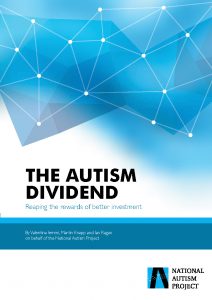Autism costs the UK economy £32 billion a year. Meanwhile, the needs of people with the condition remain unmet, a new report concludes.
The study comes almost a decade after the Autism Act 2009. Nevertheless, it finds efforts to collect data to examine the effectiveness of interventions are still inadequate.
In addition, research remains “woefully underfunded”, according to the report for the National Autism Project.
Investment, research and practice
The project aims to address the needs of autistic people through investment, research and improved practice.
Autism philanthropy group The Shirley Foundation is the driving force behind the new initiative.
The project’s report is titled The Autism Dividend: Reaping the Rewards of Better Investment. The authors are London School of Economics’ academics Valentina Iemmi and Professor Martin Knapp, and neuropharmacologist Ian Ragan.

Report co-author Professor Martin Knapp: “Even a ten-fold increase in current research investment would only bring the UK to a level comparable to the USA and Australia”
The report reads: “Even a ten-fold increase in current research investment would only bring the UK to a level comparable to the USA and Australia.
Autism costs not matched by investment
“A sum of £40 million per annum is still a mere fraction of that spent in the UK on cancer research (£500 million per annum) or dementia (currently £90 million per annum, and with substantial increases already budgeted).”
The report highlights the need to remedy deficiencies in our knowledge of autism and the effectiveness of interventions.
Until these goals are achieved, the cost of the condition would not be reduced or an improved quality of life achieved.
Highly damaging impacts
The report highlights how poor support results in weak choices and unsatisfactory outcomes. These outcomes were creating highly damaging impacts for people with autism and their families.
The findings point out that people with autism are more likely to be excluded from schools, suffer poor healthcare and have a high risk of premature death.
In addition, only 16 per cent of autistic adults in England have jobs, and two-thirds are not working at all.
Published: 8 February 2017
















